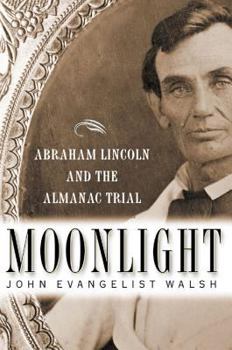Moonlight: Abraham Lincoln and the Almanac Trial
Select Format
Select Condition 
Book Overview
On August 29, 1857, in the light of a three-quarter moon, James Metzger was savagely beaten by two assailants in a grove not far from his home. Two days later he died and his assailants, James Norris and William Armstrong, were arrested and charged with his murder. Norris was tried and convicted first. As William "Duff" Armstrong waited for his trial, his own father died. James Armstrong's deathbed wish was that Duff's mother, Hannah, engage the...
Format:Hardcover
Language:English
ISBN:0312229224
ISBN13:9780312229221
Release Date:June 2000
Publisher:St. Martins Press-3PL
Length:192 Pages
Weight:0.80 lbs.
Dimensions:0.9" x 5.8" x 8.6"
Customer Reviews
1 rating
Lincoln's defense...and his ethics
Published by Thriftbooks.com User , 24 years ago
Just as Lincoln was about to take on Douglas in a race for Senate, he received a desperate death-bed request that he defend the son of a friend, a friend from many years ago. The son was charged with murder; Lincoln's sense of loyalty caused him to accept the task without fee. Lincoln's success as a criminal (as distinguished from civil) attorney was spotty, and, worse, the eye-witness accounts of the murder clearly supported guilt. Indeed, the co-defendant had been handily convicted by the same evidence facing Lincoln. Walsh's short, readable account of the trial is immediately engaging. Apparently he has unearthed detail of the trial never before published. The reader comes away with a clear sense of Lincoln's uniquely pursuasive skills before a jury, and his use of the tactics of surprise, and emotion, to win a case. Walsh also raises the possibility that Lincoln crossed an ethical line, and may have permitted perjury, by allowing a witness to tesify falsely. That suggestion does not ring true to me. The witness apparantly implied privately to Abe that he knew more than what Lincoln wished him to testify to. However, Lincoln closed off the conversation and limited the discussion,and the subsequent testimony,only to a limited detail (whether the witness owned the sling-shot weapon and what happenned to it) and left unmentioned his apparant eye-witness account. That tactic is, as I understand it, proper and ethical...and is to be distinguished from permitting false testimony. This is a good read...for those who care about Lincoln's trial skills, for those who are intrigued by the process of historical research (the appendix is quite thorough), and for those who simply like a straight-forward courtroom drama. The ethical issues raised by Walsh are a bit of a stretch...but interesting to contemplate.






